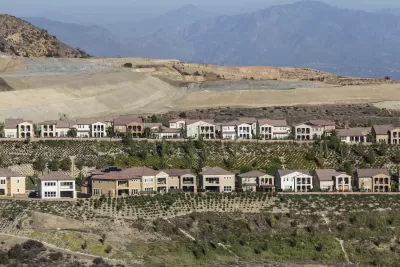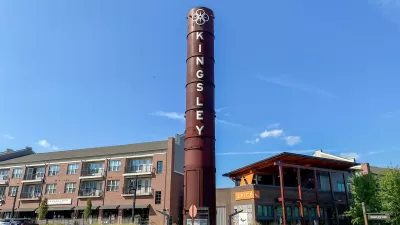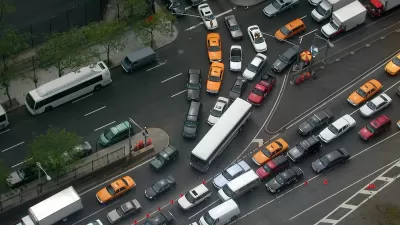While the state continues to rely on driving as a primary means of transportation, fighting climate change and the worsening housing crisis means implementing policies that encourage infill development, higher density, and public transit.

Director of the UCLA Institute of Transportation Studies (ITS) Brian Taylor describes results from ITS research analyzing how transportation and housing policies in California can shift to meet the state's climate goals and encourage more sustainable development. "Policies favoring driving over other means of getting around have for decades received little scrutiny, even as many of our metro areas have grown to where traffic congestion is now endemic. It’s no wonder that the transportation sector accounts for more than 40 percent of all of the state’s greenhouse gas emissions, and cars for about three-quarters of that."
"Building primarily around the car consumes a lot of land, costs a lot of money, and generates a lot of emissions," writes Taylor. "Indeed, our diverse panel of interviewed experts mostly called for metropolitan and transportation planning to become more urban-focused and shift to a less sprawling, car-dependent future."
The study highlighted the need for deprioritizing cars, boosting housing density, and improving public transit options in central cities. "Beyond the state’s urban cores, suburbs will need to fill in rather than spread out further into fire-prone areas."
Taylor notes that "Even in small towns and rural areas, new developments should be constructed to make it easier for people to park once and walk to multiple destinations, rather than driving from parking lot to parking lot in developments strung along roadways."
Taylor acknowledges that "old habits die hard" and changing entrenched patterns of urban development won't happen overnight—but today's policy decisions will drive future results.
FULL STORY: Don’t let the California Dream become a transportation nightmare

Alabama: Trump Terminates Settlements for Black Communities Harmed By Raw Sewage
Trump deemed the landmark civil rights agreement “illegal DEI and environmental justice policy.”

Planetizen Federal Action Tracker
A weekly monitor of how Trump’s orders and actions are impacting planners and planning in America.

The 120 Year Old Tiny Home Villages That Sheltered San Francisco’s Earthquake Refugees
More than a century ago, San Francisco mobilized to house thousands of residents displaced by the 1906 earthquake. Could their strategy offer a model for the present?

LA’s Tree Emergency Goes Beyond Vandalism
After a vandal destroyed dozens of downtown LA trees, Mayor Karen Bass vowed to replace them. Days later, she slashed the city’s tree budget.

Sacramento Leads Nation With Bus-Mounted Bike Lane Enforcement Cameras
The city is the first to use its bus-mounted traffic enforcement system to cite drivers who park or drive in bike lanes.

Seattle Voters Approve Social Housing Referendum
Voters approved a corporate tax to fund the city’s housing authority despite an opposition campaign funded by Amazon and Microsoft.
Urban Design for Planners 1: Software Tools
This six-course series explores essential urban design concepts using open source software and equips planners with the tools they need to participate fully in the urban design process.
Planning for Universal Design
Learn the tools for implementing Universal Design in planning regulations.
Ada County Highway District
Clanton & Associates, Inc.
Jessamine County Fiscal Court
Institute for Housing and Urban Development Studies (IHS)
City of Grandview
Harvard GSD Executive Education
Toledo-Lucas County Plan Commissions
Salt Lake City
NYU Wagner Graduate School of Public Service





























